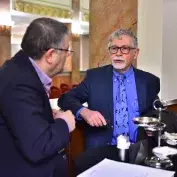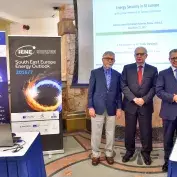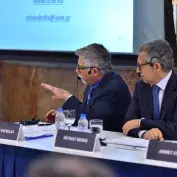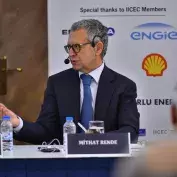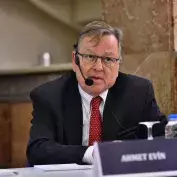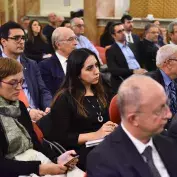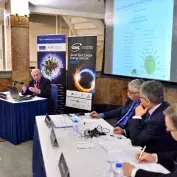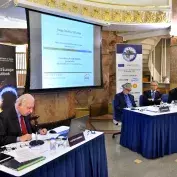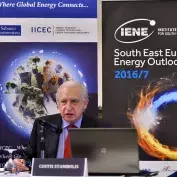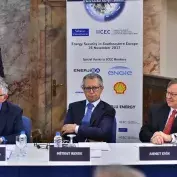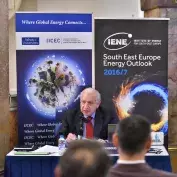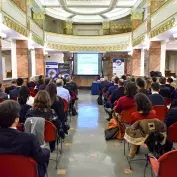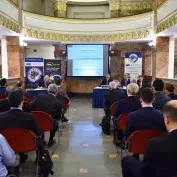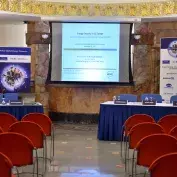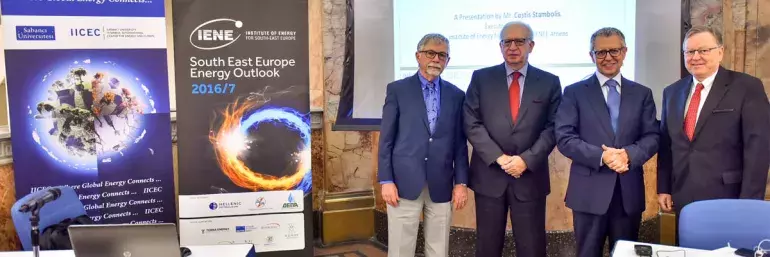
Presentation by Mr. Costis Stambolis (IENE) “Energy Security in Southeastern Europe”
Sabancı University Istanbul International Center for Energy and Climate (IICEC) and the Institute of Energy for South East Europe (IENE) organized their first joint-event, Energy Security in Southeastern Europe. Mr. Costis Stambolis’ (Executive Director of IENE) presentation was followed by a panel moderated by Director of IICEC, Professor Carmine Difiglio, featuring Ambassador Mithat Rende, Independent Board Member of Engie Turkey, and Emeritus Professor Ahmet Evin, Sabancı University. In attendance were energy industry executives, high-level representatives from energy-related associations, Consulate officers, professionals from the energy industry and Sabancı University Energy Technologies and Management students. A reception followed the talk.
Mr. Stambolis’ presentation was based on Energy Security issues covered in IENE’s SE Europe Energy Outlook 2016/17. Mr. Stambolis explained why a regional study for Southeastern Europe was necessary since micro-level decisions could not be made simply with information available from global studies, such as the IEA’s World Energy Outlook (Stambolis also noted that IEA Executive Director and IICEC Honorary Board Chairman Fatih Birol provided support and review of SE Europe Energy Outlook 2016/17. Issues covered by Mr. Stambolis included:
- Defining energy security (affordable and uninterrupted energy supply in a sustainable manner)
- Assessing security of energy in the EU and SEE
- Discussing EU’s energy security strategy and energy security issues in SE Europe
- Outlining SE Europe’s gas and electricity markets
- Pointing out the role of natural gas in the region
- Explaining the significance of the South Corridor and its future
- Pointing out the role of natural gas in the region
- How Turkey could be a natural gas trading hub for SE Europe
Mr. Stambolis concluded by discussing the future of market liberalization in SE Europe, business opportunities provided by liberalization and opportunities for financing the energy sector in SE Europe.
After the presentation, Professor Ahmet Evin made remarks on Mr. Stambolis’ assessment regarding the opportunity for Turkey to use more gas as intermittent supply in the medium and long-term as an environmentally friendly source. Professor Evin pointed out that, geographical position and having neighbors rich in fossil fuels, is enhancing Turkey’s role in EU’s energy security. Another point made by Evin was how Turkey could best contribute to energy security in a region where Russia’s is attempting to dominate natural gas supplies. He added that the analysis of the region clearly shows that transiting gas through Turkey to SE Europe will be a significant contribution to energy security especially considering the natural gas supplies from the Caspian via TANAP and TAP.
Ambassador Mithat Rende stressed the significance of improving Turkey’s energy mix and diversification of sources, enhance and realize major projects to contribute to European energy security. He mentioned the significance of the Southern gas corridor, following the 2006 crisis. Rende said that TurkStream together with TANAP and TAP, are the backbones of the southern energy security. He added that renewables have increased their energy share and will continue to rise considering the priority of fighting climate change. For the same reason, natural gas is on the rise because it is an intermittent source with low CO2 emissions. LNG is on the rise, more is to arrive from the United States, and hence we need more regasification terminals that contribute to gas-to-gas competition. Rende concluded that given its geography, capacity, and experience, Turkey can be a natural gas hub. He said that “We believe that if necessary steps are taken -liberalize the energy market- it is a good opportunity.”
During the Q&A session with the distinguished guests, a number of interesting issues were raised including the role of East Mediterranean gas on regional energy security and geopolitics.
In his closing remarks, Mr. Stambolis touched upon Turkey’s rising energy demand. Stambolis mentioned that the statistics indicate that Turkey is the number two energy consumer in Europe, and she will keep this solid position. Stambolis noted Turkey has some mega projects in renewables and nuclear to satisfy its own needs and said that although TANAP is also a mega-project, with the potential to grow up to 30 bcm to increase its ability to supply other countries.
